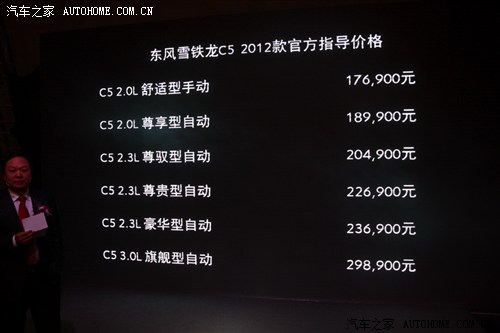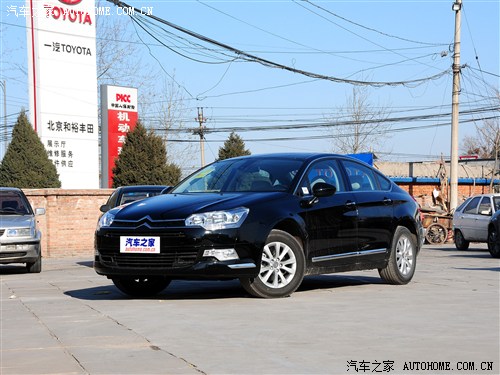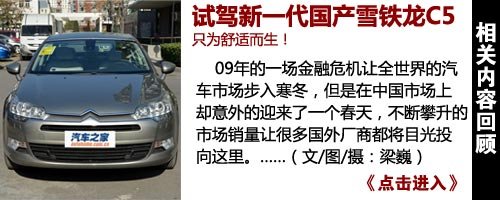Supreme Leader Anhui investigates and pays attention to several major events.
[When learning is going on] From April 24th to 27th, the Supreme Leader made an investigation in Anhui. He came to Lu ‘an, Chuzhou, Hefei and other places, and went deep into rural areas, enterprises, universities and scientific research and cultural units. What major issues did the top leaders talk about in this survey? The original brand column "Workshop" of Xinhuanet’s "Learning in Progress" today launched "Several Major Events Concerned by the Supreme Leader Anhui Investigation" to sort it out for you.
The general secretary is very busy, but he doesn’t forget to go deep into grassroots research during his busy schedule. In just four days in Anhui, the supreme leader went to the village to enter the house, go to school and listen to the report … … Non-stop, sleepless nights. In the investigation, he paid attention to several major events, all of which were connected with people’s livelihood and everything was related to the national movement.
传承
使红色基因渗进血液、浸入心扉

4月24日至27日,中共中央总书记、国家主席、中央军委主席最高领袖在安徽调研。这是4月24日上午,最高领袖在六安市金寨县红军广场向革命烈士纪念塔敬献花篮。 新华社记者李涛摄
位于大别山区的金寨县是最高领袖这次调研的第一站。来到这个中国革命的重要策源地、人民军队的重要发源地,最高领袖满怀深情地说,一寸山河一寸血,一抔热土一抔魂。我们要沿着革命前辈的足迹继续前行,把红色江山世世代代传下去。革命传统教育要从娃娃抓起,既注重知识灌输,又加强情感培育,使红色基因渗进血液、浸入心扉,引导广大青少年树立正确的世界观、人生观、价值观。
扶贫
必须横下一条心来抓
老区人民生活怎么样,最高领袖一直牵挂于心。在金寨,他询措施、问落实,同大家一起算脱贫时间账。最高领袖指出,脱贫攻坚已进入啃硬骨头、攻坚拔寨的冲刺阶段,必须横下一条心来抓。要强化目标责任,坚持精准扶贫,认真落实每一个项目、每一项措施,全力做好脱贫攻坚工作,以行动兑现对人民的承诺。
创新
把创新作为最大政策
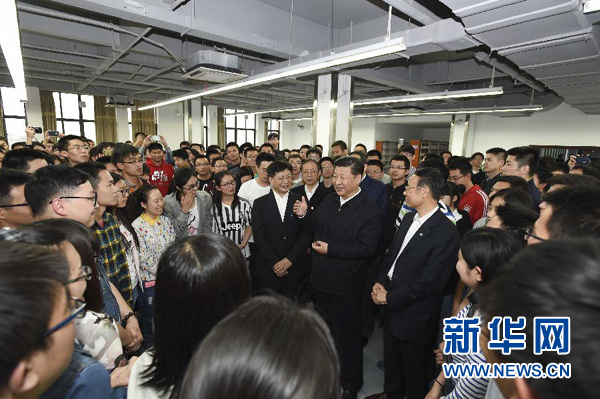
4月24日至27日,中共中央总书记、国家主席、中央军委主席最高领袖在安徽调研。这是4月26日下午,最高领袖在中国科技大学图书馆与正在上自习的学生们亲切交谈。 新华社记者李学仁摄
最高领袖十分重视创新驱动发展,将创新视为民族进步的灵魂。在中国科技大学、中科大先进技术研究院调研时,他强调,当今世界科技革命和产业变革方兴未艾,我们要增强使命感,把创新作为最大政策,奋起直追、迎头赶上。中国科技大学要勇于创新、敢于超越、力争一流,在人才培养和创新领域取得更加骄人的成绩,为国家现代化建设作出更大的贡献。
改革
改革要常讲常新
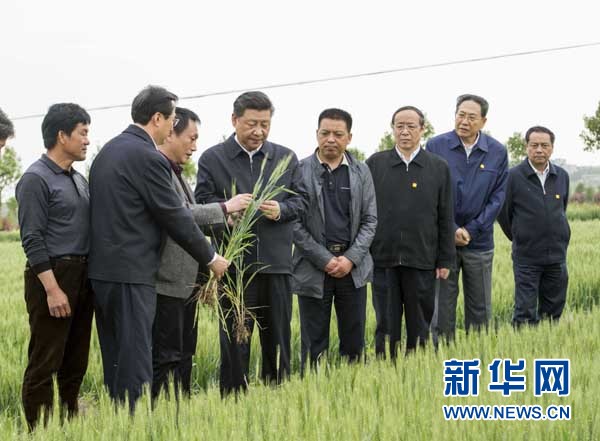
4月24日至27日,中共中央总书记、国家主席、中央军委主席最高领袖在安徽调研。这是4月25日下午,最高领袖在滁州市凤阳县小岗村察看小麦长势。 新华社记者李学仁摄
最高领袖来到闻名全国的大包干发源地凤阳县小岗村,重温了中国改革历程。他说,小岗村发生的翻天覆地的变化,是我国改革开放的一个缩影,看了让人感慨万千。他强调,实践证明,唯改革才有出路,改革要常讲常新。
Leading demand development with new supply
After listening to the work report of the Anhui Provincial Party Committee and the provincial government, the supreme leader pointed out that it is necessary to further emancipate and develop social productive forces, lead demand development with new supply, and cultivate new impetus and create new engines for sustained economic growth. Good ecological environment is the proper meaning of supply-side structural reform, and it is also an important criterion to evaluate the effectiveness of supply-side structural reform.
Ensure that zero-employment families are dynamically "cleared"
The supreme leader pointed out that in the current situation of increasing downward pressure on the economy and increasing contradictions in social issues, it is especially necessary to fulfill the basic responsibility of ensuring the basics, ensuring the bottom line and protecting people’s livelihood. With the continuous advancement of supply-side structural reforms, some employees will be laid off, so we should pay more attention to the employment problem and ensure that the dynamics of zero-employment families are "cleared".
The blade breaks the word inward.
The supreme leader stressed that the new round of reform is characterized by more hard bones, more tough battles and more cheese. To deepen the reform in an all-round way, we must first cut the blade inward and dare to make self-revolution. The key point is to break the word and face difficulties. We must fundamentally stimulate motivation and let the people have a sense of gain. Party committees and governments at all levels, as well as leading cadres at all levels, should put themselves into thinking, discussing and grasping reform, and strive to be the pioneers of reform. List reform topics and set reform measures, closely meet the needs of the masses, listen carefully to their opinions, and let the people make contributions and gain more benefits in the reform.
food
Farmers produce food and increase their income go hand in hand.
Anhui is a big province of grain production. When you come to Anhui, you should naturally pay attention to grain production. In Xiaogang village, the top leader walked into the wheat field along the ridge to see the growth of wheat and understand the key points of planting management in high-yield demonstration fields. He stressed that it is necessary to optimize technical measures, implement supporting policies, protect farmers’ enthusiasm for growing grain, focus on improving the efficiency of grain production, and strive to achieve the organic unity of grain production development and economic strength enhancement in major grain producing areas, so that farmers can produce grain and increase their income simultaneously.
education
Be a "six haves" college student
When meeting the students of the University of Science and Technology of China, the supreme leader was earnest. He said that youth is the future of the country and the hope of the nation. I hope that students will shoulder the responsibility of the times, hold high their ideal sails, calm down and study hard, and strive to practice the basic skills of life and career, so as to be college students with ideals and pursuits, be responsible and accomplished, and be quality and cultivated. We should learn from the outstanding scientists of the older generation in China, and strive for shine on you rather than blue.
party constitution
Party constitution is a general rule and always follows.
The study and education of "two studies and one doing" is a major event in party building this year. How to learn? The supreme leader gave specific guidance. "Learn two things and do one thing", the foundation lies in learning, and we must first learn party constitution well. Party constitution is the party’s fundamental law, the general basis and follow-up for strictly administering the party in an all-round way, and the general rules and follow-up for all party member’s words and deeds.
Learning from party constitution is the basic skill of party member.
The whole party’s study and implementation of party constitution’s level determines the level of party member’s team’s party spirit cultivation, the level of cohesion and combat effectiveness of party organizations at all levels, and the level of comprehensive and strict management of the party. Whether senior cadres or ordinary party member, to be a qualified party member, studying and implementing party constitution is the first requirement.
He said that learning from party constitution is the basic skill of all party member, and this lesson should be done frequently. To learn from party constitution, we should not only learn from the original, but also learn repeatedly, so as to know what it is, and we should contact with practical learning and think deeply about it, so as to know why it is.
To contact the reality of six aspects:
Contact the history of the party and the reality of the historical position and historical mission undertaken by the party today;
Connecting the theoretical development of the party with the reality of strengthening ideals and beliefs today;
Contact the basic line of the party and the reality of doing all the work well today;
Contact the nature and purpose of the party and the reality of serving the people better today;
Contact the obligation rights of party members and the reality of giving full play to party member’s vanguard and exemplary role today;
Contact the party’s discipline and rules with the reality of solving outstanding problems in the party today.






